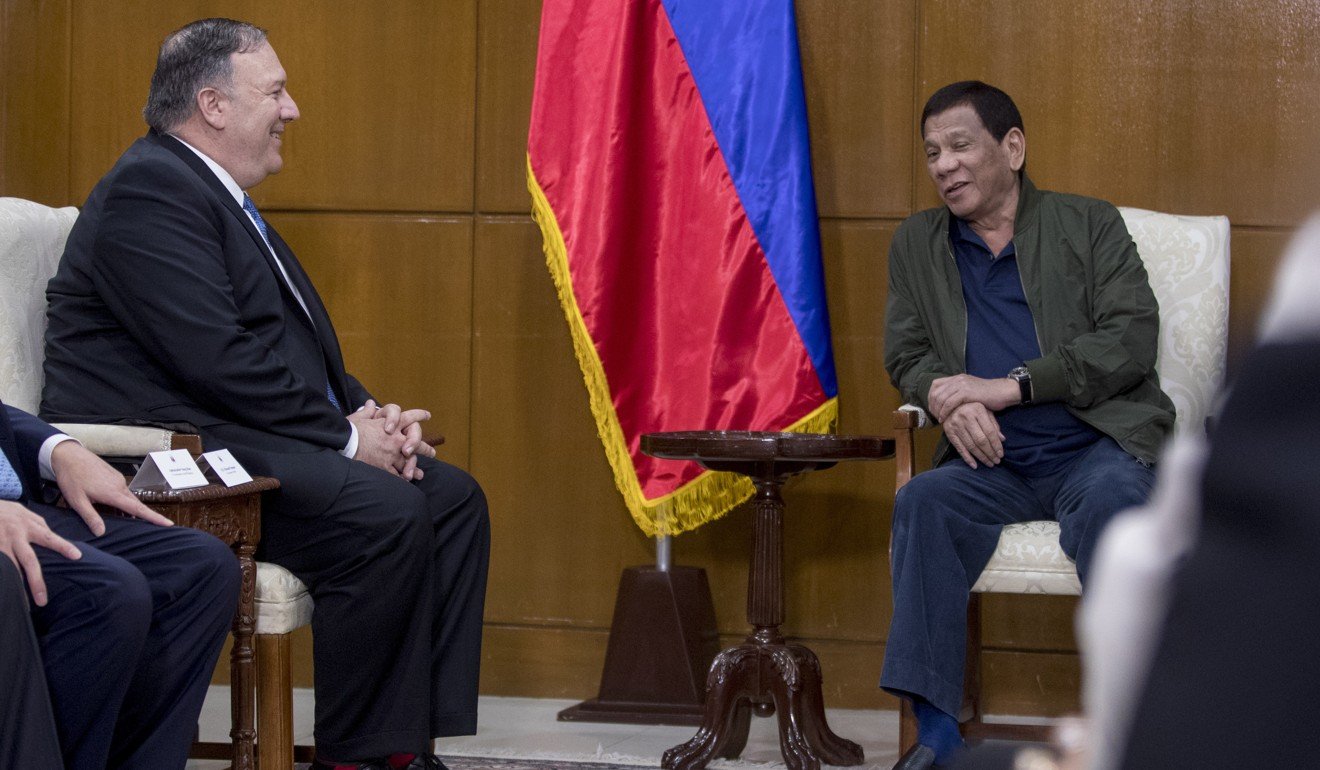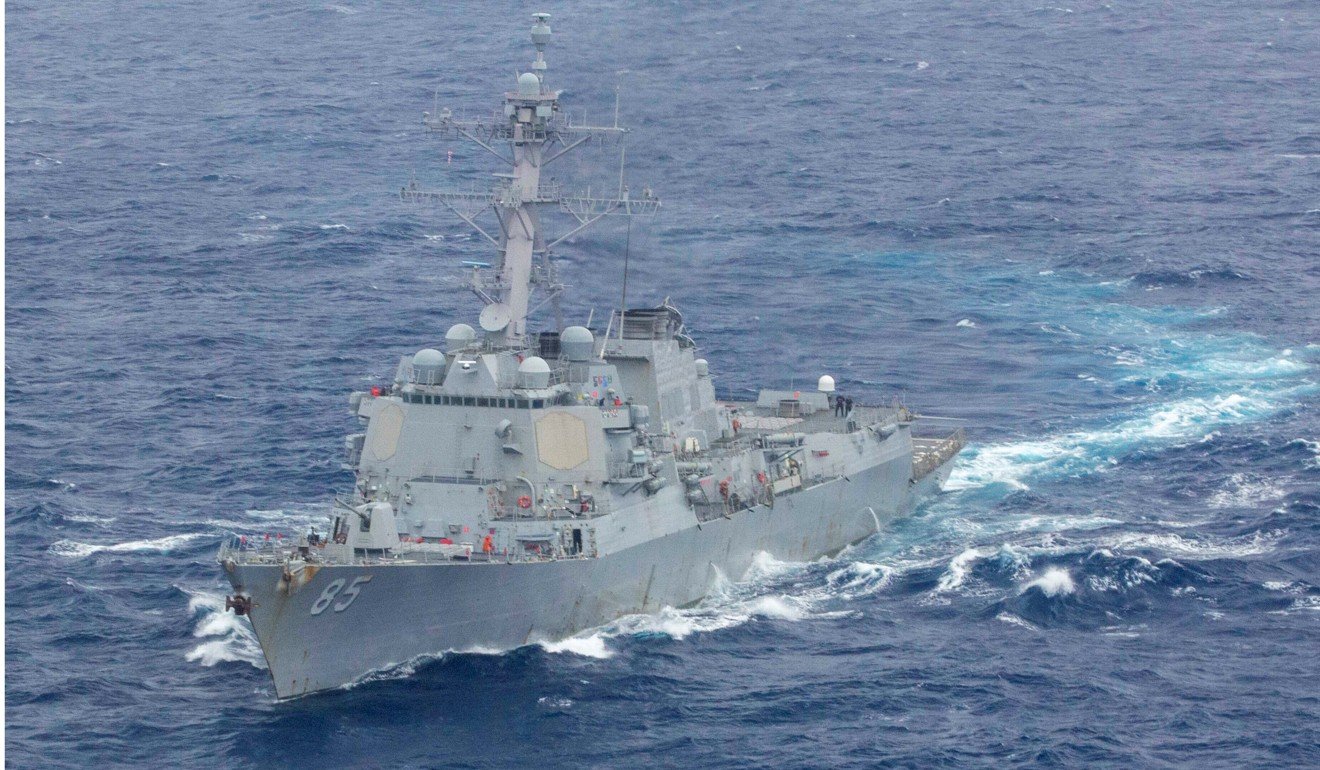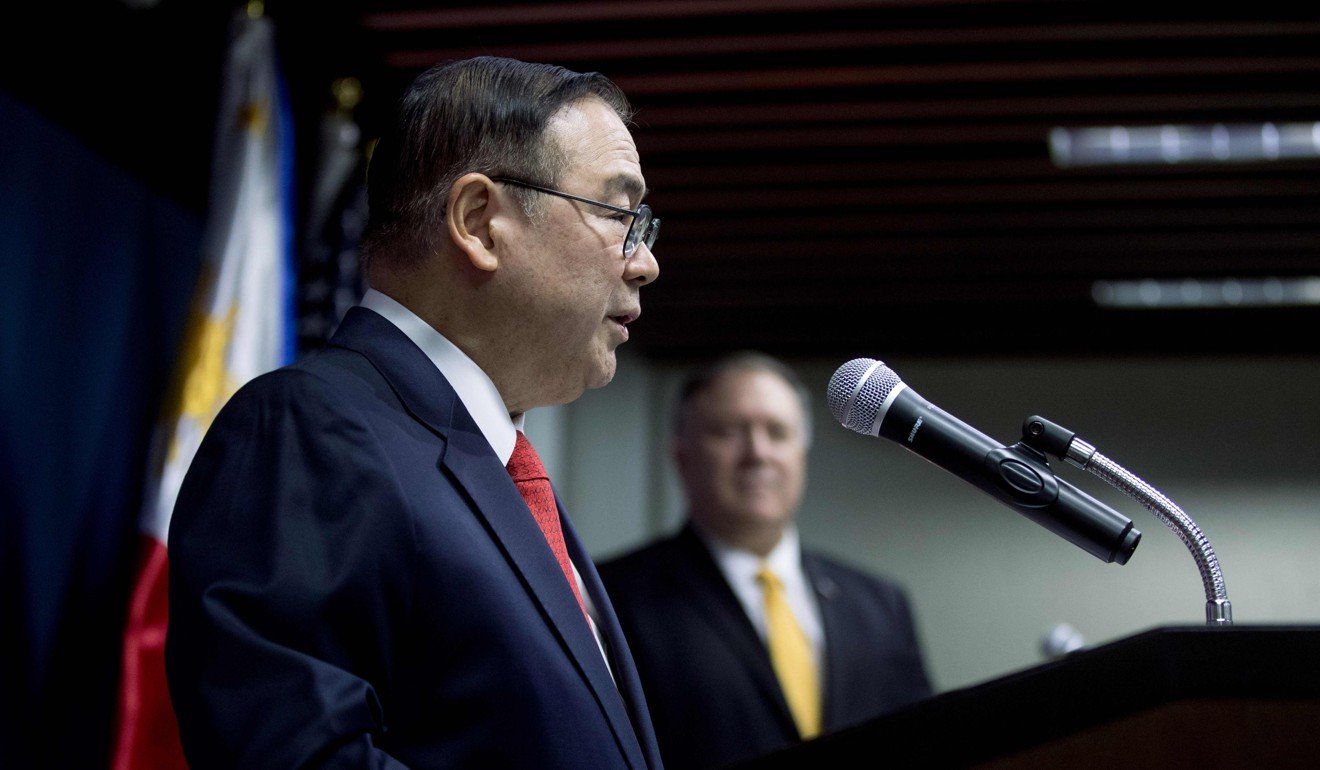
US promises to defend the Philippines from ‘armed attack’ in South China Sea, as Manila mulls review of defence treaty
- Secretary of State Mike Pompeo made the pledge after meeting Philippine President Rodrigo Duterte
- His statement angered Beijing, which views US activity in the disputed waters as a violation of its sovereignty
Pompeo, after a meeting with Philippine President Rodrigo Duterte in Manila, said the country depended on “free and unobstructed access to the seas” as it was an island nation.
“China’s island-building and military activities in the South China Sea threatens your sovereignty, your security and therefore your economic livelihood.
“As the South China Sea is part of the Pacific, any armed attack on Philippine forces, aircraft or public vessels in the South China Sea would trigger mutual defence obligations under Article IV of our Mutual Defence Treaty,” the former CIA director said.

Lu, in comments to reporters, hit back by pointing out that Southeast Asian countries and China were already working towards an agreement to mitigate tensions in the disputed waters. The South China Sea includes one of the world’s most important shipping lanes and is believed to be rich in mineral and marine resources.
“The situation is steadily moving in a good direction, and all parties concerned are committed to promoting negotiations on the Code of Conduct in the South China Sea,” said Lu.
“If countries outside the region, such as the United States, really keep in mind the peace and well-being of the region, they should not stir up trouble.”
Respect Chinese sovereignty in South China Sea, Beijing warns Washington
Philippine presidential spokesman Salvador Panelo confirmed that Pompeo had personally assured Duterte “any attack against any vessel of the Philippines would trigger the application of the Mutual Defence Treaty.”
Pompeo’s visit came on the heels of a request from Philippine defence secretary Delfin Lorenzana to review the 1951 US-Philippine Mutual Defence Treaty.
His remarks were the first definitive statements to come from a top US official about Washington’s course of action if China tried to claim Pag-Asa Island or the BRP Sierra Madre navy ship on Second Thomas Shoal. Both are guarded by Filipino soldiers.
US officials in previous administrations had repeatedly said they would not take sides in any territorial dispute in the South China Sea.

Pompeo’s message goes some way in calming anxieties in the Philippines over China’s dominance, said an analyst.
Maritime law expert Jay Batongbacal called the speech “a bit more reassuring than previous statements. There is less uncertainty in Pompeo’s statement than before”.
“Pompeo’s statement restates original assurances by US given in 1979 and reiterated in 1995,” said Batongbacal, director of the Institute of Maritime Affairs at the University of the Philippines. “But its significance lies in fact that it has been publicly and openly declared by a US secretary of state, and that it specifically refers to the South China Sea.”
But security and defence analyst Jose Antonio Custodio said Pompeo’s message lacked detail.
“[He] did not really say anything new. The US has always assured [the Philippines of coming to its aid]. The problem is, we want specifics,” he said.
“The Philippines has not been upfront with its own treaty obligations with the US, preferring to depend wholly on the Americans [for external defence].”
US Navy sends two warships through Taiwan Strait, risking friction with Beijing
Greg Poling, director of the Washington-based Asia Maritime Transparency Initiative, said: “The US is bound to respond to aggression in the South China Sea. What’s important is that Article IV [of their treaty] obligates both sides to act as necessary to meet the threat.
“Consultations would determine what that response would be, such as an immediate limited strike, a broader military response or non-military sanctions,” added Poling, who was earlier on Thursday quoted by local media as saying Pompeo’s statement established a “a clear deterrent for the Chinese”.

Custodio noted that Article IV of the treaty specifies that an armed attack that would trigger a mutual response of aid has to occur in the “Pacific area” – a phrase that has drawn confusion for its vagueness.
Critics of the treaty have pointed out that the disputed features in the South China Sea are nowhere in the Pacific Ocean.
But Custodio said the “Pacific area” mentioned in the treaty does not refer to the Pacific Ocean but rather “the area of US military operations” – which has expanded in recent years. “The US Pacific Command has been renamed the US Indo-Pacific Command, which recognises an even larger area of responsibility as compared to before.”
US commander pushes for more funding to counter China’s influence in Indo-Pacific
Batongbacal, from the University of the Philippines, said the vagueness of the phrase was beneficial to Manila.
“The assurance is against an attack on Philippine government assets anywhere in the South China Sea. That should be enough,” he said. “If it gets any more specific, it will spell out to a potential attacker the specific geographic limits of application of the treaty. That would not be wise.”
In comments made on Friday’s press briefing, the Philippine foreign secretary appeared to hold the same view.
“In vagueness lies the best deterrence,” he said.

